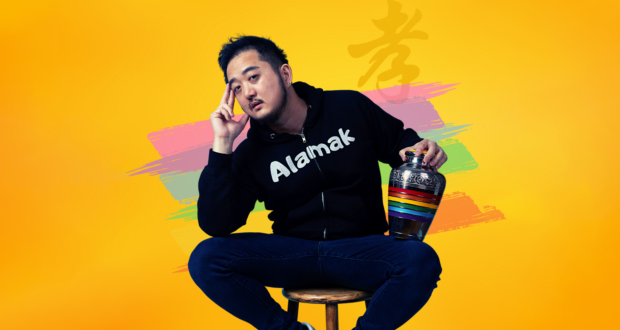With his unique brand of stand-up group comfort, Ricky Sim's gentle humour soothes deep-seated, shared pain.Summary
Rating
Good
Gentle humour that meanders its way through painful traumas, much like therapy does, is where we are at with Ricky Sim‘s one hour stand-up comedy Coming Out to Dead People (An Asian Queer Story). Laugh-out-loud funny it is not.
Much of his material is very similar to other budding start-up comedians of a similar age group, and it is very relatable, regardless of sexual orientation: the sexual fumbling with a first boyfriend, under the pretence of studying, in a teenage bedroom that mother will never allow to be locked properly; the crushing realisation that the recipient of your affections considers you lover material at best, but not a marriage option; the pressure to please a partner perceived as more cool, beautiful or intelligent than yourself, at an age when our self-esteem is not yet fully built out. And there’s the weight of a parent’s expectation that their child marry a professional, affluent, tradition-loving spouse.
Other material is uniquely bound with the pain of those who fit non-mainstream ethnic groups or sexual preferences. “Oh my God, are you really gay? I thought you were just being Asian” is one of his more memorable lines. It captures brilliantly how many spend their life navigating through others’ stereotypes, where the default is a flick between one prejudice and the other, never offering a zero stereotype option at all.
Touchingly, however, Ricky also has a very personal core material that will resonate with thousands and will cross ethnic, sexual and age boundaries. Some of this material he has brilliant names for, such as “intergeneration bullying”. Some he does not have names for, but appropriate mood lighting will tell the audience that Ricky is feeling his way along very deep, personal scars and that humour and stand-up have had, and still have, restorative powers for him. No one in the audience will be heard laughing at those turns, as the room swells with palpable empathy and recognition.
How does a son respond when a dying parent is used by the surviving parent as emotional blackmail into doing or not doing something: “If you marry a girl your mum will live longer and die happy.” How do you talk back when a dying mother expresses her concern that a gay person will not have children and will die alone, without the comfort of family around? Approaching Ricky’s show with the expectation of learning the secret to coming out to Asian parents misses the point and plays to yet another stereotype.
Ricky’s very personal emotional journey can only tell the unique story of his own missed opportunity and his own delicately balanced decision of what and what not to tell a dying parent. Without giving away the final revelation, at the end of the hour, we are made to feel with him the unspeakable difficulty of opening up to a parent about one’s sexuality. We come to respect the reluctance of a parent to tear down that see-through veil hiding a truth the parent already owns, even though they may not even admit it to themselves. We see that coming out is not so much a black or white decision, but more a question of finding the right moment; of a chance encounter; of opportunity taken up or deferred; of the relative strength to speak, and the strength to take in what is being said.
What you can expect in this show, is a beautiful love letter to parents from a devoted son.
Written and performed by Ricky Sim
Coming out to Dead People (An Asian Queer Story) plays at Soho Theatre until Wednesday 24 January.
Further information and bookings can be found here.
 Everything Theatre Reviews, interviews and news for theatre lovers, London and beyond
Everything Theatre Reviews, interviews and news for theatre lovers, London and beyond



